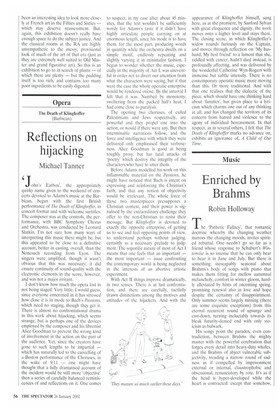Opera
The Death of Klinghoffer (Barbican)
Reflections on hijacking
Michael Tanner
John's Earbox', the appropriately quirky name given to the weekend of concerts devoted to Adams's music at the Barbican, began with the first British performance of The Death of Klinghoffer, in concert format and with welcome surtitles. The composer was at the controls, the performance, with BBC Symphony Chorus and Orchestra, was conducted by Leonard Slatkin, I'm not sure how many ways of interpreting this music there might be, but this appeared to be close to a definitive account, better in casting, overall, than the Nonesuch recording from Lyon. The singers were amplified, though it wasn't obvious that this was necessary; it did ensure continuity of sound-quality with the electronic elements in the score, however, and was not a major irritant
I don't know how much the opera lost in not being staged. Very little, I would guess, since everyone concerned in it has stressed how close it is in mode to Bach's Passions, which need no staging, though they get it. There is almost no confrontational drama in this work about hijacking, which seems strange, but is perhaps one of the devices employed by the composer and his librettist Alice Goodman to prevent the wrong kind of involvement in the action on the part of the audience. Yet, since the creators have gone to such lengths to be impartial — which has naturally led to the cancelling of a Boston performance of the Choruses, in the wake of 9/11 — one might have thought that a fully dramatised account of the incident would be still more 'objective' then a series of carefully balanced reminiscences of and reflections on it. One comes
to suspect, in my case after about 45 minutes, that the text wouldn't be sufficiently wordy for Adams's taste if it didn't have highly articulate people carrying on at enormous length, since his mode is to have them, for the most part, producing words in quantity while the orchestra dwells on a simple motif, endlessly repeating and slightly varying it in minimalist fashion. I began to wonder whether the music, especially in the majority of Act I, was uneventful in order not to divert our attention from what the characters were saying, but if that were the case the whole operatic enterprise would be rendered otiose. By the interval I felt that it was. Numbed by monotony, sweltering from the packed hall's heat, I had come close to paralysis.
The opening two choruses, of exiled Palestinians and Jews respectively, are powerful and they propel one into the action, or would if there were any. But then interminable narrations follow, and the force and intelligence with which they were delivered only emphasised their verboseness. Alice Goodman is good at being toughly prosy, but has fatal attacks of 'poetry' which destroy the integrity of the characters who have to utter them.
Before Adams modelled his work on this inflammable material on the Passions, he might have noticed that Bach is intent on expressing and reinforcing the Christian's faith, and that any notion of objectivity would be irrelevant. The whole force of those two masterpieces presupposes a Christian context, and their power is signalised by the extraordinary challenge they offer to the non-Christian to resist their message. But Klinghoffer is devoted to exactly the opposite enterprise, of getting us to see and feel opposing points of view, to understand perhaps without judging, certainly as a necessary prelude to judgment. The soporific nature of most of Act means that one feels that an important — the most important — issue confronting the contemporary world is being neglected in the interests of an abortive artistic experiment.
With Act II things improve dramatically, in two senses. There is at last confrontation, and there are carefully, tactfully drawn distinctions among the motives and attitudes of the hijackers. And with the
appearance of Klinghoffer himself, sung here, as at the premiere, by Sanford Sylvan with great eloquence and dignity, the work moves onto a higher level and stays there. The closing scene, in which Klinghoffer's widow rounds furiously on the Captain, and moves through reflection on 'My husband, My best friend' to a lament that she, riddled with cancer, hadn't died instead, is profoundly affecting, and was delivered by the wonderful Catherine Wyn-Rogers with immense but subtle intensity. There is no contemporary operatic music more moving than this. Or more traditional. And with that one realises that the dialectic of the piece, which should have one thinking hard about 'fanatics', has given place to a lyricism which charms one out of any thinking at all, and has changed the territory of its concern from hatred and violence to the agony of individual bereavement. In that respect, as in several others, I felt that The Death of Klinghoffer marks no advance on, exhibits an ignorance of, A Child of Our Time.


















































































 Previous page
Previous page